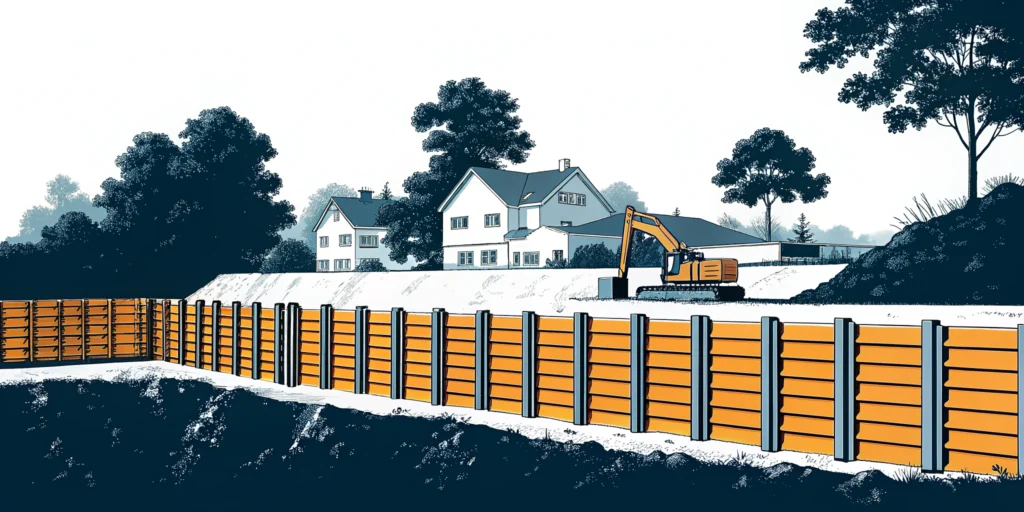Recognize the value of retaining wall engineering
Retaining wall engineering firms in the Puget Sound region serve as key allies when you need to stabilize steep slopes, support deep excavations, or protect your project from shifting soils. We understand how stressful it can be to juggle local regulations, unpredictable rainfall, and the unique geological conditions in areas like Seattle and Tacoma. By tapping into professional expertise, you create a safer and more cost-effective foundation for commercial, industrial, and hillside residential developments.
Professionals know that retaining walls aren’t just about holding soil in place. They also ensure drainage systems work correctly, prevent erosion, and comply with building codes. That’s why experienced engineers go beyond generic solutions to tailor designs based on site-specific soil reports and performance expectations.
Consider the role of soldier pile walls
One popular solution in steep and wet environments is the soldier pile wall. This type of retaining structure uses steel I-beams (known as piles) driven into the ground at set intervals, then reinforced with lagging boards or concrete. The result is a strong wall that adapts to various site conditions.
Soldier pile walls are especially effective in Seattle, Tacoma, and other Puget Sound communities because they handle high soil pressures and frequent rain. If you’re looking to get started, consider soldier pile wall engineering in seattle. You’ll discover design options, drilling techniques, and slope reinforcement methods that can fit even tight access sites.
Avoid common pitfalls in design and installation
Retaining wall design errors can lead to bulging walls, shifting foundations, and expensive repairs. Here are mistakes to watch for:
- Underestimating soil loads. It’s essential to calculate the lateral earth pressures accurately, so your retaining wall withstands Pacific Northwest rains and potential flooding.
- Skimping on drainage. Without consistent water removal, walls can fail due to saturated backfill.
- Overlooking local regulations. Seattle and Tacoma have strict guidelines for walls taller than four feet. Permits, inspections, and professional engineering are typically required.
- Selecting inadequate materials. A mismatch between wall type and soil conditions often causes early wear or instability.
When you work with retaining wall engineering services puget sound, you gain guidance on soil analysis, load calculations, and suitable building materials. This reduces guesswork, helping you avoid headaches down the line.
Account for costs and maintenance
Cost planning is crucial, whether you’re stabilizing a residential backyard or shoring a large commercial site. You’ll want to factor in engineering fees, supplies, labor, and potential site constraints like narrow access. For further insights, you can check out retaining wall installation costs puget sound to get a clearer idea of typical budget ranges.
Maintenance is another ongoing expense that many overlook at first. Regular inspections, drainage checks, and minor repairs extend the life of your wall. Soldier pile walls often need good surface drainage, occasional rust prevention on exposed steel, and timely reapplication of protective coatings. If you plan routine upkeep, you’ll reduce the likelihood of large-scale fixes that can disrupt your project timeline.
Frequently asked questions
1. Do I really need an engineer for my retaining wall?
Yes. In the Puget Sound region, walls taller than four feet usually require professional design to meet local codes. An expert ensures your wall is structurally sound, matches soil conditions, and includes proper drainage.
2. How do soldier pile walls handle rainy weather?
Soldier pile walls are built to manage the high moisture levels so common in Seattle and Tacoma. The steel piles, combined with lagging boards or concrete, provide strong lateral support and help channel water away from the wall’s base.
3. Is a concrete retaining wall always stronger?
Poured concrete walls are typically robust, but they’re not the only option. Soldier pile walls, masonry, or even interlocking blocks can be just as effective if they’re well-engineered and properly installed.
4. Can I save by handling maintenance on my own?
Basic tasks like clearing debris and checking for drainage blockages are fine to manage yourself. For structural inspections or major repairs, though, professional assistance ensures you maintain the integrity of your retaining wall over the long term.
When you’re ready, consult with retaining wall specialists to secure your construction site and protect your investment. By selecting an experienced engineering firm, you lay the groundwork for a stable, code-compliant, and worry-free project for years to come.
Ready to start your own soldier pile wall project in Seattle, Tacoma, or anywhere in Puget Sound?
Learn how Ruffhouse Construction delivers safe, code-compliant soldier pile and lagging wall installations for any site.
See our Soldier Pile Installation Services for details and request a free estimate today.

